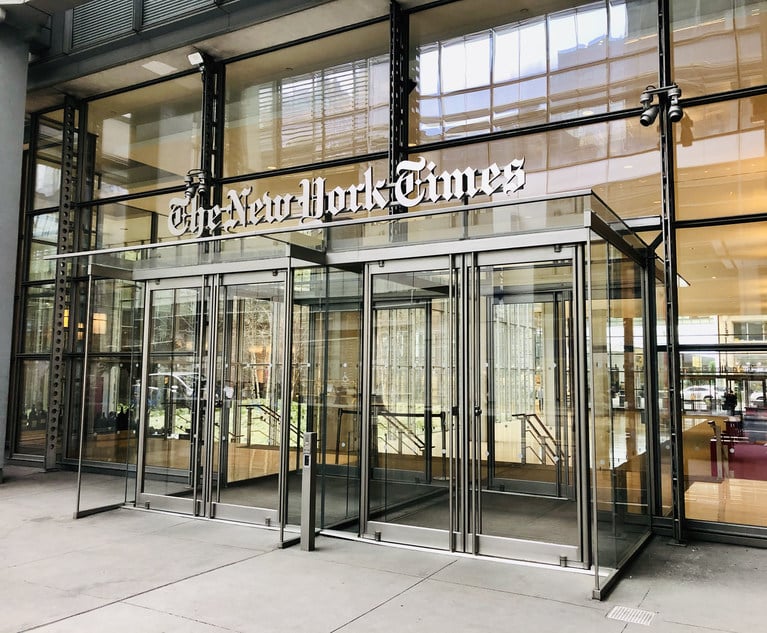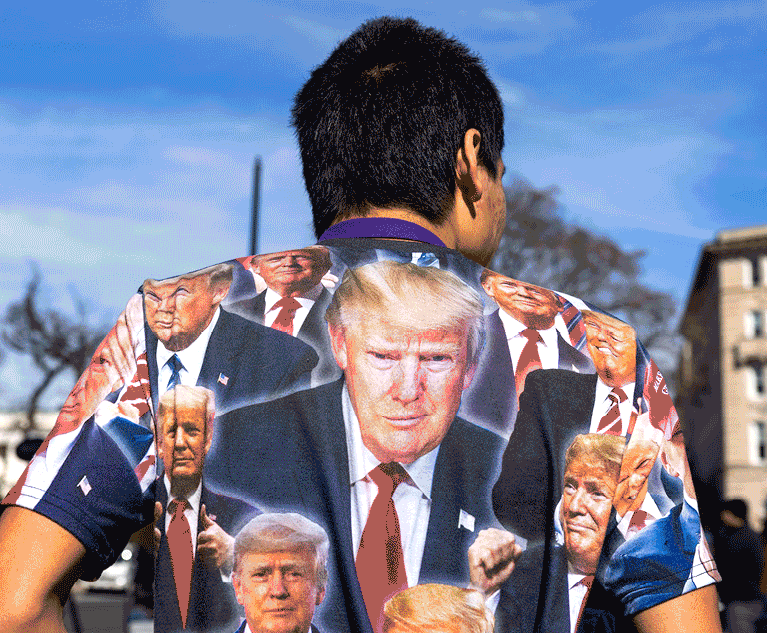Second Circuit Allows Broader Judicial Discretion in Denying Attachments
A pre-judgment order of attachment freezing a defendant's assets can have extraordinary implications on finances, operations and even third parties. A recent Second Circuit decision provides a clearer path for defendants to argue that these implications may be considered, in the court's discretion, as grounds to deny an attachment that is otherwise proper under New York law.
September 15, 2022 at 12:15 PM
7 minute read
 Attachment is a powerful litigation tool that can have the drastic effect of tying up a defendant's assets at the start of a litigation, well before a judgment is entered. Most commonly, the purpose of an attachment is to provide security to the plaintiff. If the plaintiff wins the case, the attached assets may be applied to pay down a money judgment.
Attachment is a powerful litigation tool that can have the drastic effect of tying up a defendant's assets at the start of a litigation, well before a judgment is entered. Most commonly, the purpose of an attachment is to provide security to the plaintiff. If the plaintiff wins the case, the attached assets may be applied to pay down a money judgment.
Under New York law, attachment is a creature of statute. Its application, and limitations, derive from Article 62 of the New York Civil Practice Law and Rules (CPLR). The first hurdle to obtaining an attachment is found in §6201. This section states that an order of attachment may be granted in any action, other than matrimonial, where the plaintiff seeks a money judgment and at least one of five statutory grounds exists. Of the five grounds listed in §6201, two of the most commonly asserted are (1) the defendant is a nondomiciliary residing without the state, or is a foreign corporation not qualified to do business in the state, and (2) the defendant, with intent to defraud his creditors or frustrate the enforcement of a judgment that might be rendered in plaintiff's favor, has assigned, disposed of, encumbered or secreted property, or removed it from the state or is about to do any of these acts.
Additionally, in order to maintain an attachment, §6212 requires a showing that (a) it is probable that plaintiff will succeed on the merits of a cause of action, and (b) the amount demanded is in excess of all known counterclaims. Moreover, under §6223, a plaintiff has the burden of showing a "need" for the attachment. In other words, the party seeking the attachment "must demonstrate an identifiable risk that the defendant will not be able to satisfy the judgment." VisionChina Media v. S'holder Representative Servs., 109 A.D.3d 49, 60 (1st Dep't 2013). If the attachment is found to be unnecessary to the security of the plaintiff, the attachment will be vacated. CPLR 6223(a).
This content has been archived. It is available through our partners, LexisNexis® and Bloomberg Law.
To view this content, please continue to their sites.
Not a Lexis Subscriber?
Subscribe Now
Not a Bloomberg Law Subscriber?
Subscribe Now
NOT FOR REPRINT
© 2025 ALM Global, LLC, All Rights Reserved. Request academic re-use from www.copyright.com. All other uses, submit a request to [email protected]. For more information visit Asset & Logo Licensing.
You Might Like
View All
New York Times Moves for $100K in Attorney Fees Against Dfinity Foundation
3 minute read
Health Care Data Breach Class Actions Saw December Surge in NY Courts

NYC’s Oldest Deli Agrees to Update Bathrooms, Entrances to End ADA Charges
4 minute readLaw Firms Mentioned
Trending Stories
- 1Restoring Trust in the Courts Starts in New York
- 2'Pull Back the Curtain': Ex-NFL Players Seek Discovery in Lawsuit Over League's Disability Plan
- 3Tensions Run High at Final Hearing Before Manhattan Congestion Pricing Takes Effect
- 4Improper Removal to Fed. Court Leads to $100K Bill for Blue Cross Blue Shield
- 5Michael Halpern, Beloved Key West Attorney, Dies at 72
Who Got The Work
Michael G. Bongiorno, Andrew Scott Dulberg and Elizabeth E. Driscoll from Wilmer Cutler Pickering Hale and Dorr have stepped in to represent Symbotic Inc., an A.I.-enabled technology platform that focuses on increasing supply chain efficiency, and other defendants in a pending shareholder derivative lawsuit. The case, filed Oct. 2 in Massachusetts District Court by the Brown Law Firm on behalf of Stephen Austen, accuses certain officers and directors of misleading investors in regard to Symbotic's potential for margin growth by failing to disclose that the company was not equipped to timely deploy its systems or manage expenses through project delays. The case, assigned to U.S. District Judge Nathaniel M. Gorton, is 1:24-cv-12522, Austen v. Cohen et al.
Who Got The Work
Edmund Polubinski and Marie Killmond of Davis Polk & Wardwell have entered appearances for data platform software development company MongoDB and other defendants in a pending shareholder derivative lawsuit. The action, filed Oct. 7 in New York Southern District Court by the Brown Law Firm, accuses the company's directors and/or officers of falsely expressing confidence in the company’s restructuring of its sales incentive plan and downplaying the severity of decreases in its upfront commitments. The case is 1:24-cv-07594, Roy v. Ittycheria et al.
Who Got The Work
Amy O. Bruchs and Kurt F. Ellison of Michael Best & Friedrich have entered appearances for Epic Systems Corp. in a pending employment discrimination lawsuit. The suit was filed Sept. 7 in Wisconsin Western District Court by Levine Eisberner LLC and Siri & Glimstad on behalf of a project manager who claims that he was wrongfully terminated after applying for a religious exemption to the defendant's COVID-19 vaccine mandate. The case, assigned to U.S. Magistrate Judge Anita Marie Boor, is 3:24-cv-00630, Secker, Nathan v. Epic Systems Corporation.
Who Got The Work
David X. Sullivan, Thomas J. Finn and Gregory A. Hall from McCarter & English have entered appearances for Sunrun Installation Services in a pending civil rights lawsuit. The complaint was filed Sept. 4 in Connecticut District Court by attorney Robert M. Berke on behalf of former employee George Edward Steins, who was arrested and charged with employing an unregistered home improvement salesperson. The complaint alleges that had Sunrun informed the Connecticut Department of Consumer Protection that the plaintiff's employment had ended in 2017 and that he no longer held Sunrun's home improvement contractor license, he would not have been hit with charges, which were dismissed in May 2024. The case, assigned to U.S. District Judge Jeffrey A. Meyer, is 3:24-cv-01423, Steins v. Sunrun, Inc. et al.
Who Got The Work
Greenberg Traurig shareholder Joshua L. Raskin has entered an appearance for boohoo.com UK Ltd. in a pending patent infringement lawsuit. The suit, filed Sept. 3 in Texas Eastern District Court by Rozier Hardt McDonough on behalf of Alto Dynamics, asserts five patents related to an online shopping platform. The case, assigned to U.S. District Judge Rodney Gilstrap, is 2:24-cv-00719, Alto Dynamics, LLC v. boohoo.com UK Limited.
Featured Firms
Law Offices of Gary Martin Hays & Associates, P.C.
(470) 294-1674
Law Offices of Mark E. Salomone
(857) 444-6468
Smith & Hassler
(713) 739-1250







